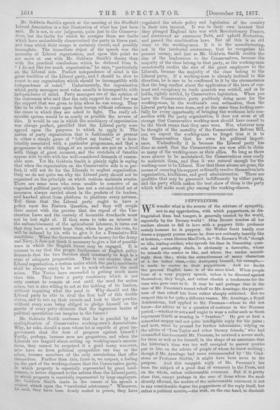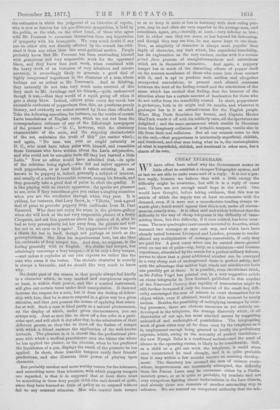PEPPERINESS.
WE wonder what is the source of the mixture of sympathy, not to say approbation, with which pepperiness, as dis- tinguished from bad temper, is generally treated by the world, especially by the literary world ? Miss Brontb teaches all her readers almost to fall in love with a peppery little professor mainly because he is peppery. Sir Walter Scott hardly ever draws a peppery person whom he does not evidently heartily like at bottom,—even Hector MacTurk, in "St. Ronan's Well," though an idle, loafing soldier, who spends his time in fomenting quar- rels and promoting duels, is obviously a favourite, whom he intends the reader to like, and whom the reader accord- ingly does like ; while the attractiveness of many characters of a far better class,—the Antiquary himself, for example,— is made to centre in their pepperiness. And no doubt the general English taste is of the same kind. When people hear of a very peppery speech, unless it be directed against themselves, they laugh, and rather cherish a tenderness for the man who gave vent to it. It may be said perhaps that in the case of Mr. Freeman's recent rebuff to Mr. Armitage, the pepperi- ness of that rebuff has been rather sharply criticised. Bat we suspect this is for quite a different reason. Mr. Armitage, a Royal Academician, had applied to Mr. Freeman—whom he did not know—for advice as to a question of costume in the Norman period,—whether or not a serf ought to wear a collar such as Scott represents Gurth as wearing in "Ivanhoe." Ifs got at first a somewhat snappy and not quite intelligible reply for his pains ; and next, when he pressed for further information, relying on the advice of 'Tom Taylor and other literary friends,' who had counselled him to consult Mr. Freeman, he received a severe snub, for them as well as for himself, in the shape of an assurance that the historian's time was too well occupied to answer queries put to him on the advice of people of whom be knew nothing ; though if Mr. Armitage had come recommended by 'Mr. Glad- stone or Professor Stubbs,' it might have been more to the purpose. And this snappish reply of Mr. Freeman's has been the subject of a good deal of comment in the Press, and on the whole, rather unfavourable comment. But it is pretty clear that, except perhaps in the case of those whom the snub directly affected, the motive of the unfavourable comment is not in any considerable degree the pepperiness of the reply itself, but rather a political motive,—the wish, on the one hand, to diminish
the estimation in which the judgment of an historian of repute, who is now so famous for his pro-Slavonic sympathies, is held by the public, or the wish, on the other hand, of those who agree with Mr. Freeman to exonerate themselves from any imputation of sympathy with his brusquerie. We very much doubt if any one on either side not directly affected by the remark has criti- cised it from any other than this semi-political motive. People probably know that Mr. Freeman has been overloading himself with gratuitous and very responsible work for the oppressed Slays, and they know that such work, when combined with the heavy work of an historian of very laborious and minute accuracy, is exceedingly likely to generate a good deal of highly compressed impatience in the character of a man whose feelings are so ardent as Mr. Freeman's. And so thinking, they naturally do not take very much more account of this fiery snub to Mr. Armitage and his friends,—quite undeserved though it was,—than they would of a squib going off when it gets a sharp blow. Indeed, editors print every day much less excusable outbursts of pepperiness than this, on questions purely literary, and evidently are rather amused by them than offended. Tak.e the following amenities, for instance, on the merits of certain Latin translations of English verse, which we cut out from the correspondence columns of one of the Edinburgh newspapers of the present week:—" D. C., however, with the obstinacy characteristic of the mule, and the stupidity characteristic of the ass, maintains the truth of this" (no matter what) ; and again, " No man was over so stupid naturally as D. C., who must have taken pains with himself, and resembles those Germans who have written about the Latin subjunctive, and who could not be complete fools till they had learned a little Latin." Now no editor would have admitted that,—in spite of the criticism being signed,—who did not rather approve of such pepperiness, or at least think it rather amusing. A man known to be peppery is, indeed, generally a subject of interest, and usually of a rather favourable interest, among his friends, and they generally take a good deal of pains to elicit the quality. It is like playing with an electric apparatus ; the sparks are pleasant to see, even if they sometimes give you rather a tingling sensation when you are the conductor through which they pass. It is evident, for instance, that Lucy Snow, in Villette," took a good deal of pains to provoke peppery little outbreaks from M. Paul Emanuel. Who does not enjoy the scene in the picture-gallery when she will look at the not very respectable picture of a fleshy Cleopatra, and ask him questions about his opinion of it, after he had so very peremptorily led her away from the picture and told her not to set eyes on it again? The pepperiness of the man has a charm for her in itself, though not perhaps as much as the peremptoriness. She likes his imperiousness best, but she likes his outbreaks of fiery temper too. And that, we suppose, is the feeling generally with us English. We dislike had temper, but admiringly encourage a fiery temper,—if it be only a fiery temper, —and unless it explodes at our own expense we rather like the man who owns it the better. The choleric character in comedy is always a favourite, and we should like very much to know why.
No doubt part of the reason is that people always feel kindly to a character which, in very marked and conspicuous aspects at least, is within their power, and like a musical instrument, will give out certain tones under their manipulation, It does not increase the respect for a man, but it does the feeling of fellow- ship with him, that he is sure to respond in a given way to a given stimulus, and that you possess the means of applying that stimu- lus at will. Such a man is liked partly as a natural phenomenon, on the display of which, under given circumstances, you can always rely. Just as men like to show off a fine echo in a parti-
cular spot, and will elicit it day after day, to the admiration of their different guests, so they like to show off the flashes of temper with which a friend answers the application of the well-known irritants. The pleasure in it is almost like the professional ples-
sure with which a medical practitioner sees the blister rise where he has applied the plaster, or the chemist, when he has predicted
the liquidation of a gas, displays the result of the pressure he has applied. In short, these irascible tempers verify their friends' predictions, and also illustrate their power of playing upon character.
But probably another and more worthy reason for the tolerance, and something more than tolerance, with which peppery tempers are regarded, is that it is supposed that at least there must be something in these fiery people child-like and devoid of guile, since they have learned so little of policy as to respond without fail to any external .stimulus. Men who control their temper so as to keep it more or less in harmony with their ruling pur- pose, may be and often are very superior to the average man, and sometimes, again, are,—morally, at least,—very inferior to him ; but in either case they are more or less beyond hie fathoming, and though they may use him, he can never hope to use them. Now, as simplicity of character is always more popular than depth of character, any trait which, like superficial irascibility, has its explanation on the very surface, carries with it a certain prima facie promise of straightforwardness and naturalness which are in themselves attractive. And again, a peppery temper has so much of the disturbing effects of pepper itself on the mucous membrane of those who come into close contact with it, and is apt to produce such sudden and altogether unexpected convulsions, to present such absurd contrasts between the heat of the feeling roused and the minuteness of the cause which has excited that feeling, that the humour of the situation alone has a certain amount of fascination for those who do not suffer from the irascibility roused. In short, pepperiness is grotesque, both in its origin and its results, and whatever is grotesque has in it an attractiveness for the English people. When Meg Dods flourishes her broom, and Captain Hector MacTurk wards it off with his soldierly cane, all the spectators are delighted ; and the same amusement which results in literature from the imaginary collisions of irritable tempers, results also in life from their real collisions. But all our reasons come to this in the end,—that pepperiness is intrinsically superficial, childish, and irrational, and that man being what he is, the contemplation of what is superficial, childish, and irrational in other men, has a charm of its own.







































 Previous page
Previous page